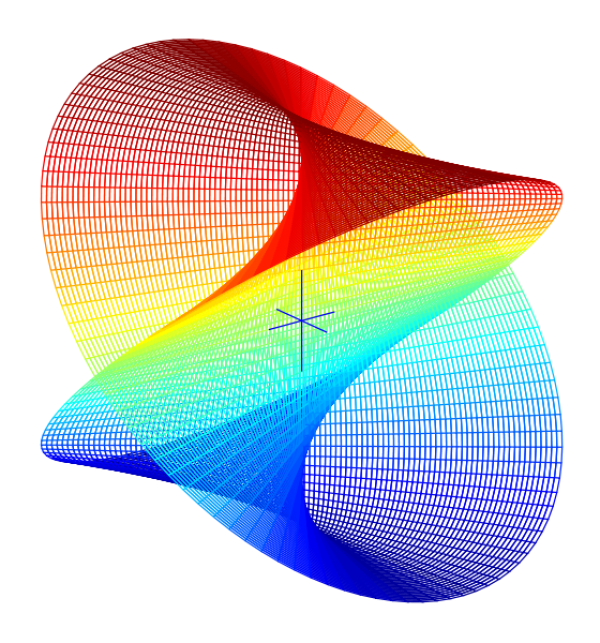

Graphic generated using mathematics. Source: Wikipedia user Krishnavedala.
12 December 2012
Some people say that maths is not for everyone. Many say that we should value people for their differing strengths, whether mathematic, dramatic or athletic.
It speaks to the dignity of every human being, and to the importance of exploring and valuing the stupendous breadth of human achievement. But we are in jeopardy of taking it too far, and this is dangerous for the country and unjust to its youth.
The present phase of global development, which has thrust us unprepared into a digital age, is mystifying. It is intangible, dematerialised, abstract and conceptual. It will be conquered by those capable of abstract reasoning and problem-solving. Mathematics has reasserted itself as the language of the 21st century.
So many contemporary technologies – everything from nuclear power to electronics – are so complicated that we are increasingly subjected to a ‘rule by experts’. Whether visiting the doctor because we have a virus or the computer nerds because we have a computer virus, we routinely put our faith in a world beyond our comprehension.
In the Middle Ages the secrets of how to make things were locked in the minds and customary practices of the artisans and their guilds. Capital and the industrial revolution spread of technologies like steelmaking and steam power, opening production to anyone with capital. At that time technology made industrial processes easier to understand. But this is no longer the case.
Today much rests in trust on expert knowledge. Incidentally, this is probably one reason for the resurgence of religion in modern societies. Those who have knowledge acquire a certain monopoly power, which can all too easily be abused.
Perhaps above all, our economies, and particularly financial markets, speak in the language of mathematics. Since the mid-1990s financial traders have increasingly been highly trained mathematicians and physicists. The financial crisis which began in 2007 was characterised by speculation in derivatives, sub-prime-loans, collateralized mortgage obligations, and leveraged buyouts beyond the knowledge of most people. Pensions and livelihoods were wiped out and global peace has been imperilled in the process.
Mathematical errors play a role in generating financial crises. However the underlying basis for economic crisis is inequality, which increasingly requires that the diminishing earnings of ordinary people be supplemented by unsustainable credit.
If more people could participate in and contest the distribution of incomes, the terms of credit agreements, and irresponsible derivative instruments, the outcome may be a fairer and more sustainable world. But for this to happen what is invisible needs to be made visible. The looking glass is encrypted mostly in mathematics.
Mathematical thinking is important on an even more basic level. It allows a person to measure the future, work out what must be saved today so that one can eat tomorrow. In that sense algebra is an elixir for freedom.
In this light what is happening in South Africa is deeply troubling. In 2009, all grade 6 learners in the Western Cape took standard numeracy tests. The pass rate in integrated, former Model C schools was 60.2%. In African township schools it was 2.1%.
Of the 1 035 192 who started school in 2000, just 104 033 – only 10% – were able to pass mathematics in 2011. Moreover there has been a sharp drop in the numbers of learners taking Maths, with a decline of 20 716 or 17% from 2010. More learners now take Maths Literacy than Maths. The former, whilst offering a foundation for coping as a consumer, does not develop abstract reasoning. It has an 86% pass-rate at matric level, whereas Maths has a 46% pass-rate.
It is widely understood that the fixation on, and politicisation of, the matric results by the public, the media and government, is resulting in learners being pushed out of Maths into Maths Literacy. Doing so pushes up the overall matric pass-rate of a school, district or province.
A component of the 2011 Census is something called the “Census at School” in which Stats SA asked learners a range of questions. I was astonished to hear from the Statistician General Mr Pali Lehohla last week that the survey of learners in grades 3 – 7 revealed that Maths was by far the popular subject! It was 4 times more popular than any other subject. But by grades 8 – 12 it had lost the top spot. By high school the pressure to pass makes Maths unpopular, because it is difficult. Or is it?
My own conviction is that with quality teaching and good books almost everyone can become moderately accomplished in mathematics. But we’re not offering young people this opportunity. In 2009 JET Education Services conducted a study in 268 schools in eight provinces. The study had one question: what is 1/4 + 3/5? Just 53% of grade 4 maths teachers and 72% of grade 5 maths teachers answered this question correctly.
It is trite that mathematics is the gateway to science, medicine, commerce, engineering and many other vital parts of the economy. Many young people from townships schools enroll for humanities degrees because that is all they are eligible for. But the number of black humanities graduates unable to get jobs is staggering and worrying. The fact that many of the unemployed youth involved in the Egyptian Revolution in 2011 held university degrees is a lesson here.
I am not making a fetish of mathematics. The arts are a vital part of exploring reality. In any case mathematics cannot be mastered without language comprehension and grammar. But I do think the future of our society is tied more to the quality of our primary and secondary mathematics teaching than we realise.
Doron Isaacs is Deputy General Secretary of Equal Education. He tweets @doronisaacs